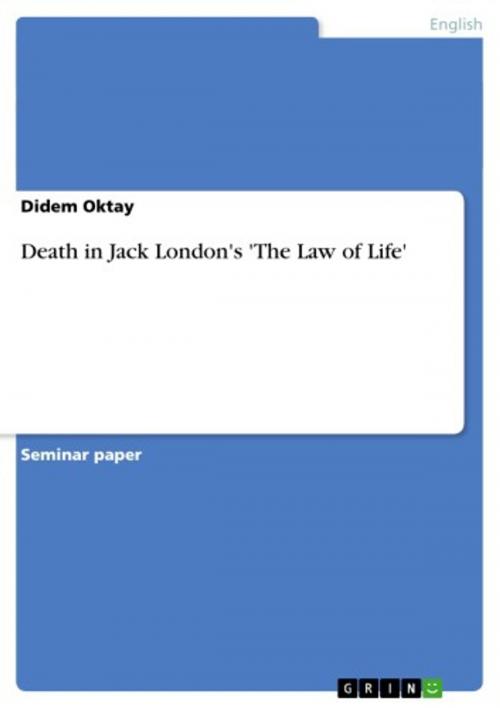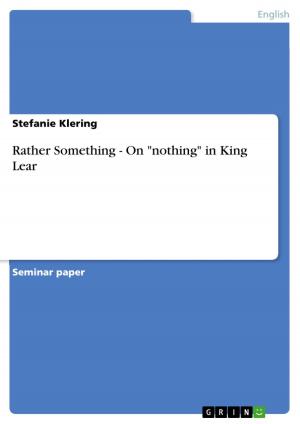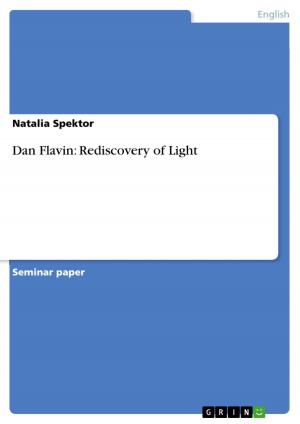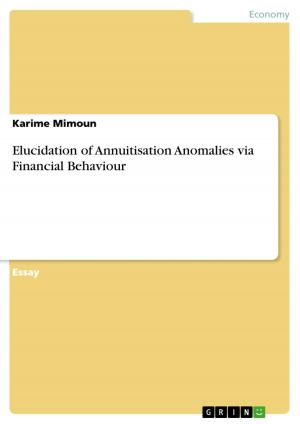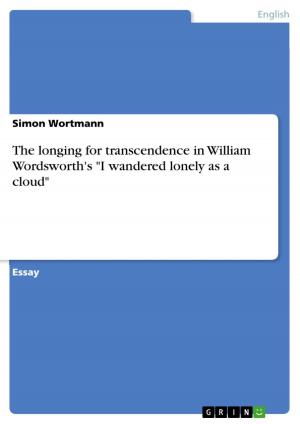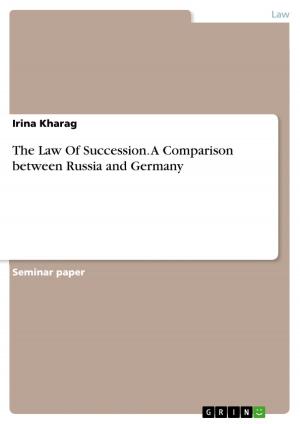| Author: | Didem Oktay | ISBN: | 9783638126663 |
| Publisher: | GRIN Publishing | Publication: | May 16, 2002 |
| Imprint: | GRIN Publishing | Language: | English |
| Author: | Didem Oktay |
| ISBN: | 9783638126663 |
| Publisher: | GRIN Publishing |
| Publication: | May 16, 2002 |
| Imprint: | GRIN Publishing |
| Language: | English |
Seminar paper from the year 1995 in the subject American Studies - Literature, grade: good, University of Frankfurt (Main) (Institute for England und America Studies), 3 entries in the bibliography, language: English, abstract: 1. The Author : Jack London (really John Griffith) was born 1876 in San Fransisco and is believed to have been the illegitimate son of William Henry Chaney, an astrologer. Flora Wellman, his mother, married John London soon after Jack's birth. He grew up on the waterfront of Oakland and his schooling was intermittent. Much of his youth was spent on the wrong side of the law. Among other things he was an oyster pirate, and he also spent a month in prison for vagrancy. At the age of 17 he signed on a sailing ship which took him to the Arctic and Japan. Despite his lack of formal education he also became a voracios reader, especially of fiction, as he reported in his autobiographical novel, Martin Eden (1909). In 1896 he joined the gold rush to the Klondike, where he found no gold but gathered ample material for the brutal, vigorous life he portrayed in The Call of the Wild (1903) and White Fang (1906), novels of man and beast struggeling against the overwhelming forces of nature. From Social Darwinism London had absorbed the idea that to survive, man must adapt to irresistible natural forces. Although his writing is often described as an example of literary naturalism, London was most deeply influenced by the seemingly irreconcilable opposites of Nietzsche and Marx. From Nietzsche he borrowed the idea of the super human, evident in its most destructive form in Wolf Larsen, the predatory hero of London's The Sea Wolf (1904). From Marx he took the idea of the need for social reform and of the power of economic determinism, concepts he embodied in his socialistic treatises, The war of the Classes (1905) and The Human Drift (1907), and in his terrifying vision of the coming of totalitarianism, The Iron Heel (1907). From 1900 to 1916 London wrote more than fifty books, earning a million dollars, which he spent quickly and easily as he earned it, in a frantic search for contentment. But London found gratification neither in his writing nor in his personal life, and his last years were marked by struggles with alcoholism and mental disintegration. He died, probably by his own hand, when he was forty.1 [...] ______ 1 All biographical data taken directly from Salzman, Jack (edit.).'The Cambridge Handbook of American Literature'. Cambridge : University Press, 1986. And from McMichael, George (edit.) et al. 'The Anthology of American Literature Volume II.' New York, London : 1980
Seminar paper from the year 1995 in the subject American Studies - Literature, grade: good, University of Frankfurt (Main) (Institute for England und America Studies), 3 entries in the bibliography, language: English, abstract: 1. The Author : Jack London (really John Griffith) was born 1876 in San Fransisco and is believed to have been the illegitimate son of William Henry Chaney, an astrologer. Flora Wellman, his mother, married John London soon after Jack's birth. He grew up on the waterfront of Oakland and his schooling was intermittent. Much of his youth was spent on the wrong side of the law. Among other things he was an oyster pirate, and he also spent a month in prison for vagrancy. At the age of 17 he signed on a sailing ship which took him to the Arctic and Japan. Despite his lack of formal education he also became a voracios reader, especially of fiction, as he reported in his autobiographical novel, Martin Eden (1909). In 1896 he joined the gold rush to the Klondike, where he found no gold but gathered ample material for the brutal, vigorous life he portrayed in The Call of the Wild (1903) and White Fang (1906), novels of man and beast struggeling against the overwhelming forces of nature. From Social Darwinism London had absorbed the idea that to survive, man must adapt to irresistible natural forces. Although his writing is often described as an example of literary naturalism, London was most deeply influenced by the seemingly irreconcilable opposites of Nietzsche and Marx. From Nietzsche he borrowed the idea of the super human, evident in its most destructive form in Wolf Larsen, the predatory hero of London's The Sea Wolf (1904). From Marx he took the idea of the need for social reform and of the power of economic determinism, concepts he embodied in his socialistic treatises, The war of the Classes (1905) and The Human Drift (1907), and in his terrifying vision of the coming of totalitarianism, The Iron Heel (1907). From 1900 to 1916 London wrote more than fifty books, earning a million dollars, which he spent quickly and easily as he earned it, in a frantic search for contentment. But London found gratification neither in his writing nor in his personal life, and his last years were marked by struggles with alcoholism and mental disintegration. He died, probably by his own hand, when he was forty.1 [...] ______ 1 All biographical data taken directly from Salzman, Jack (edit.).'The Cambridge Handbook of American Literature'. Cambridge : University Press, 1986. And from McMichael, George (edit.) et al. 'The Anthology of American Literature Volume II.' New York, London : 1980
